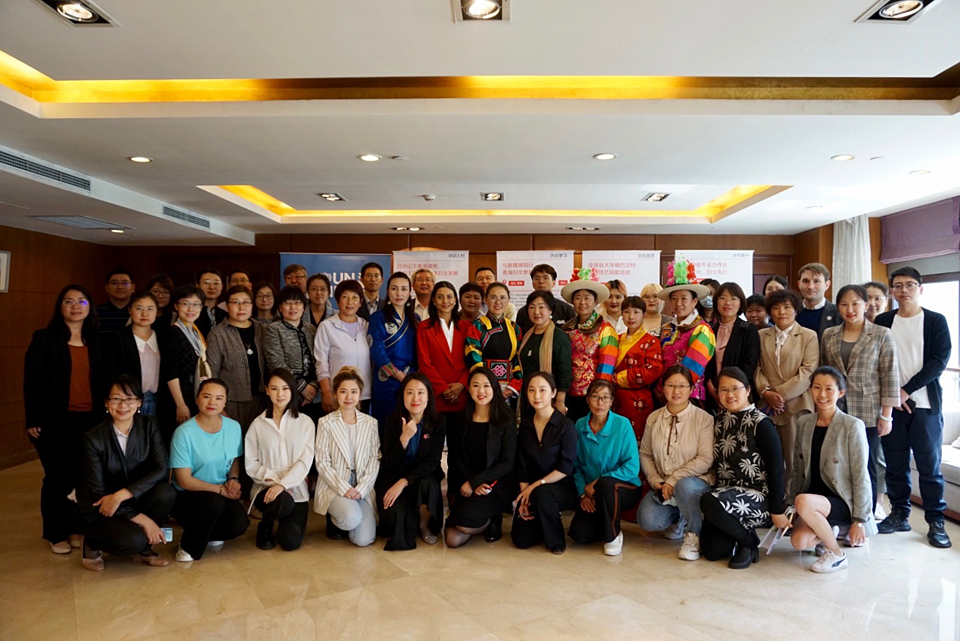UN Women convenes stakeholders in China to discuss the vital role of women in climate change adaptation and food security strategies
Date:
[Press release]
Authors: Liyue Zhou, Qing Wang, Wenting Zhao

Beijing, China - Worldwide, data shows that women and girls are at the frontlines of agriculture and natural resource management and are key guardians of agrobiodiversity and food security. Yet compared to men, they rarely have an equal right to own, use and control these resources. They also receive less support through formal or informal networks and programmes, and have less opportunity to learn and advance.
As well as being unjust, this imbalance poses major challenges for global food security and agrobiodiversity – especially in environments that are more vulnerable to climate change shocks.
To better review how these issues are impacting China, UN Women China, with the United Nations Environment Programme – International Ecosystem Management Partnership (UNEP-IEMP), The International Fund for Agricultural Development (IFAD) and the Farmers’ Seed Network (FSN) joined forces to organise a multi-stakeholder workshop. Held on April 28, 2020 in Beijing, Empowering Women: The Key for Enhancing Agrobiodiversity and Food System Transformation in Adaptation to Climate Change included over 60 representatives from government agencies, rural communities, academia, enterprises, and social and other organizations, along with UN agencies in China.
Opening speeches at the event were delivered by Smriti Aryal, Head of Office at UN Women China, Xiulin Zhang, Director of UNEP-IEMP, and Quanhui Wang, Division Director of China’s Rural Energy and Environment Agency, which is part of the Ministry of Agriculture and Rural Affairs.
Ms. Smriti Aryal stressed that women’s empowerment is a major key to successfully addressing climate change, enhancing agrobiodiversity, transforming food systems and increasing family incomes. She noted that the workshop was timely because it followed the release of the Chinese government’s 14th Five Year Plan, which is an opportune moment to look at how to best promote climate justice in the country.
Ms. Smriti Aryal highlighted three broad strategies for bringing gender equality and women’s empowerment to the heart of collective efforts in China. These are: to increase women’s leadership and decision making in the transition to a green economy; to increase financial support for and investment in women, particularly in rural areas, to ensure gender transformative, climate smart agriculture and sustainable food systems; and finally, to enhance and leverage the capacity of women and girls to build resilience to climate and disaster-related risks, mitigate climate change, and address loss and damage.
The workshop sessions provided space for participants to discuss gender-related food system policy, along with government and civil society perspectives, while leaving room for free discussion and exchange.
Closing remarks were delivered by Mr. Matteo Marchisio, IFAD Country Director, who said that to address climate change and enhance women’s empowerment we need to mobilize a range of institutions, among them social organizations, including women’s federations, and the private sectors. By collaborating with each other, he stressed, we can address current challenges better and more effectively.
The event was part of the programme, ‘Strengthening Qinghai women farmers’ income security and resilience in a changing climate’, which was founded by the Chanel Foundation and UN Women’s China office, together with UNEP-IEMP, IFAD, the Qinghai Poverty Alleviation and Development Bureau, and the Qinghai Women’s Federation. Under the project, over 360 government and private service providers have been trained to date and over 55,000 women farmers have directly benefited.
For more information, please contact:
Wenting Zhao
Communications Officer, UN Women China
Tel: +86 10 8532 6687 l Email: wenting.zhao@unwomen.org